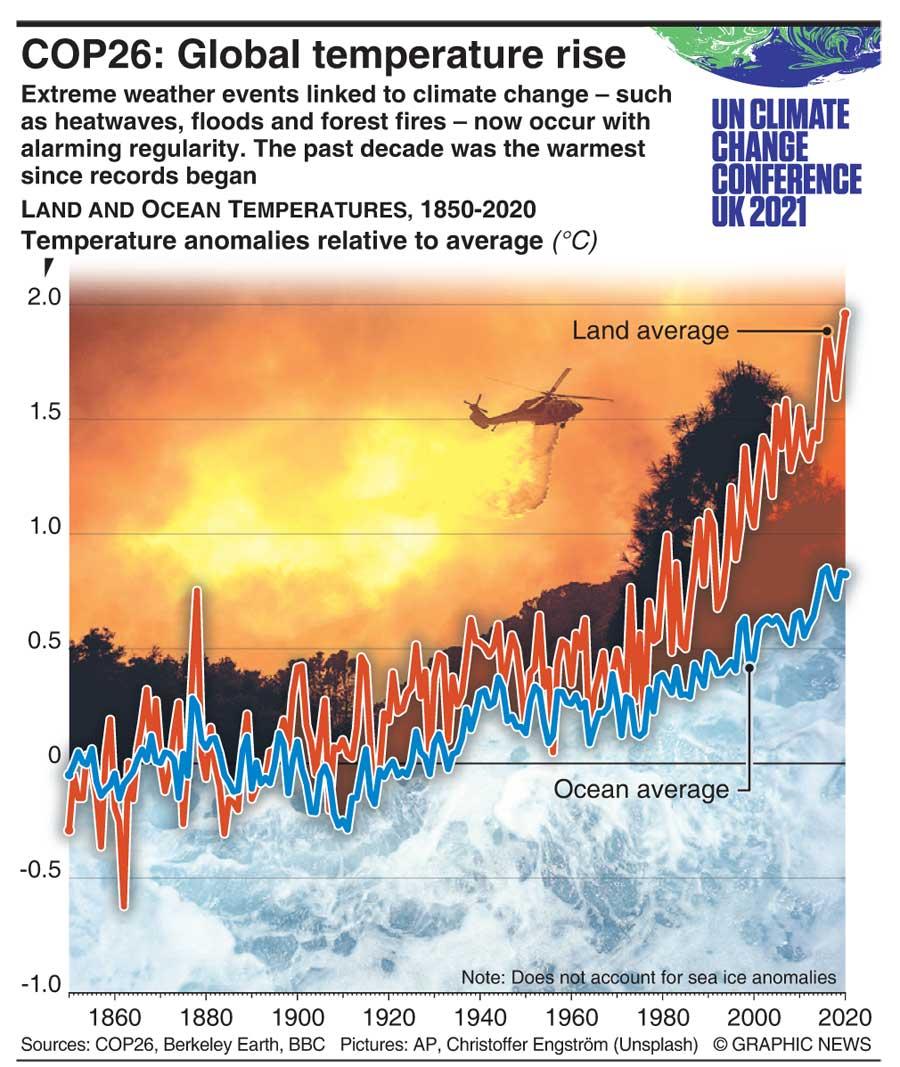29 Oct 2021 - {{hitsCtrl.values.hits}}
Come Sunday, world leaders or their representatives will gather in Glasgow, Scotland for talks aimed at making the planet habitable for generations to come and for them to live in harmony with nature. It will be the 26th United Nations Conference of the Parties – COP26.
planet habitable for generations to come and for them to live in harmony with nature. It will be the 26th United Nations Conference of the Parties – COP26.
Described as a “turning point for humanity” and “the most consequential summit… ever”, the gathering from October 31 to November 12 seeks to take the 2015 Paris Agreement on climate change to the next level by adopting more urgent and realistic measures to curb the rise in global temperatures preferably to 1.5 degree Celsius, though the aim was 2 degrees Celsius compared to pre-industrial levels.
Since the first UN Environment summit in 1992 in Rio de Janeiro, there have been many proposals at global summits but whether the nations have walked the talk is as big a question as the challenge of saving the planet and us from coming calamities, about which precursors have already come in the form of extreme weather conditions such as prolonged droughts, devastating floods and forest fires.
Due to the rise in global temperatures, Arctic and Antarctic ice oceans are melting, leading to a sea-level rise that threatens to wipe out small island nations and reduce land areas available for human activity in other countries. Not only that. The rise in temperature is also linked to global food insecurity and our health. It is feared future pandemics and epidemics could emerge with the melting polar ice caps releasing pathogens that have remained frozen for millennia.
Yet, the Glasgow summit, just as the previous environment summits, is plagued by disagreements. For instance, India, which is the third biggest polluter of the environment after China and the United States, has rejected the calls to announce a greenhouse gas zero emission target year. Sri Lanka has joined nations such as the US, Britain and the European Union to set a target date of 2050 while China and Saudi Arabia have set a 2060 deadline. On Wednesday, China released a white paper on its climate policy that sought to explain its NDC or Nationally Determined Contribution.
India’s Prime Minister Narendra Modi will attend the conference to press ahead with India’s pathway to the global warming solution. India believes the solution is not in setting dates for zero emission, but in reducing the amount of greenhouse gases to the atmosphere. India says it will cut the emissions intensity of its GDP by 33 to 35 percent by 2030 from 2005 levels. It urges other developed nations also to follow its example.
Sri Lanka’s President Gotabaya Rajapaksa told a UN environment conference on Wednesday that Sri Lanka would maintain a balance between environment and human needs.
Addressing the high-level meeting on Delivering Climate Action for People, Planet and Prosperity, the President said developed nations must fulfill their commitments to help the planet heal while the developing countries need meaningful multilateral and bilateral support to implement Climate Change mitigation.
In India’s and Sri Lanka’s approaches to the climate change question, there are undercurrents of a divide between developed and developing nations just as the divide between big and small polluters. It is believed these divisions will surface at the Glasgow summit, too, with developing nations hitting out at developed nations for “big words little action” while pursuing self-centred policies on the climate issue.
From the 17th century to well past the mid-20th century, the world’s rich and powerful countries were on a rampage to devour the natural resources of poor countries they had colonized. They became rich through their colonial-era plunder at the cost of huge environment destruction in colonized nations.
Climate change was never heard of then. Coal was widely used; no scientist issued a warning as regards the long-term adverse effects of the use of coal, though there were tell-tale marks in the premature deaths of coal mine workers. They died of lung diseases which were later identified as ‘coal worker’s pneumoconiosis’ and chronic obstructive pulmonary disease (COPD).
Even the first scientific study on the use of coal did not see the dangers it posed to environment. The study by Svante Arrhenius, the pioneering Swedish scientist in 1896 mainly foresaw the use of coal and the resultant warming of the planet as a boon, both in agricultural bounty and “more equable and better climates, especially as regards the colder regions of the Earth.” (National Georgraphy)
While the poor and the working class suffered in European coal mines to fuel the Industrial Revolution, colonized subjects in Asia, Africa and Latin America were largely ignorant of the rape of their motherlands by their colonial masters. Trees were felled and forests cleared. Agriculture lands that produced the staple food of the indigenous people were appropriated to grow crops that fed the greed of the colonialists. Raw material and minerals from colonized nations were shipped to the mother country for the end products to be sold in the colonies. Of course, the profits were also sent back to the mother country.
Today’s climate emergency is directly linked to the unchecked industrial revolution and the climate crimes of the colonial powers. After the colonialists left, these crimes were continued by the new governments. Moreover, the newly independent countries got trapped in neocolonialist snares that ensured that the western powers got their cheap supplies of raw materials from their former colonies.
However, in the 1970s and 1980s, some Third World countries began a rapid march to achieve the newly industrialized nation (NIC) status. Their success prompted many developing countries rich in resources to emulate them in the 1990s. But their dream of an NIC status also coincided with the first clarion call by the UN to save the planet. Some analysts saw the call as another ruse by the neocolonialists who dominate the UN system to maintain the global rich-poor divide, as they thought the call was an impediment to the development process. Such a call may also seem unfair, because there were no such save-the-planet calls when today’s developed nations burnt fossil fuel and damaged the environment to become rich.
This is all the more reason why, as the Sri Lankan president says, developed nations should come forward to help the developing countries to achieve their sustainable development goals. This does not mean providing technical assistance or development aid with conditions alone. This means putting an end to neocolonial and political agendas behind development aid and economically empowering poor countries by offering them debt relief and investing in these countries to make their pandemic-battered economies strong.
Calls for debt-for-climate swaps have been gaining momentum since the pandemic dealt a heavy blow to middle and low income countries. Some debt-ridden countries argue such an arrangement would allow them to go for green energy and climate change mitigation projects. They say this will not only save them but the entire globe from climate change disasters.

28 Nov 2024 26 minute ago
28 Nov 2024 34 minute ago
28 Nov 2024 2 hours ago
28 Nov 2024 2 hours ago
28 Nov 2024 4 hours ago